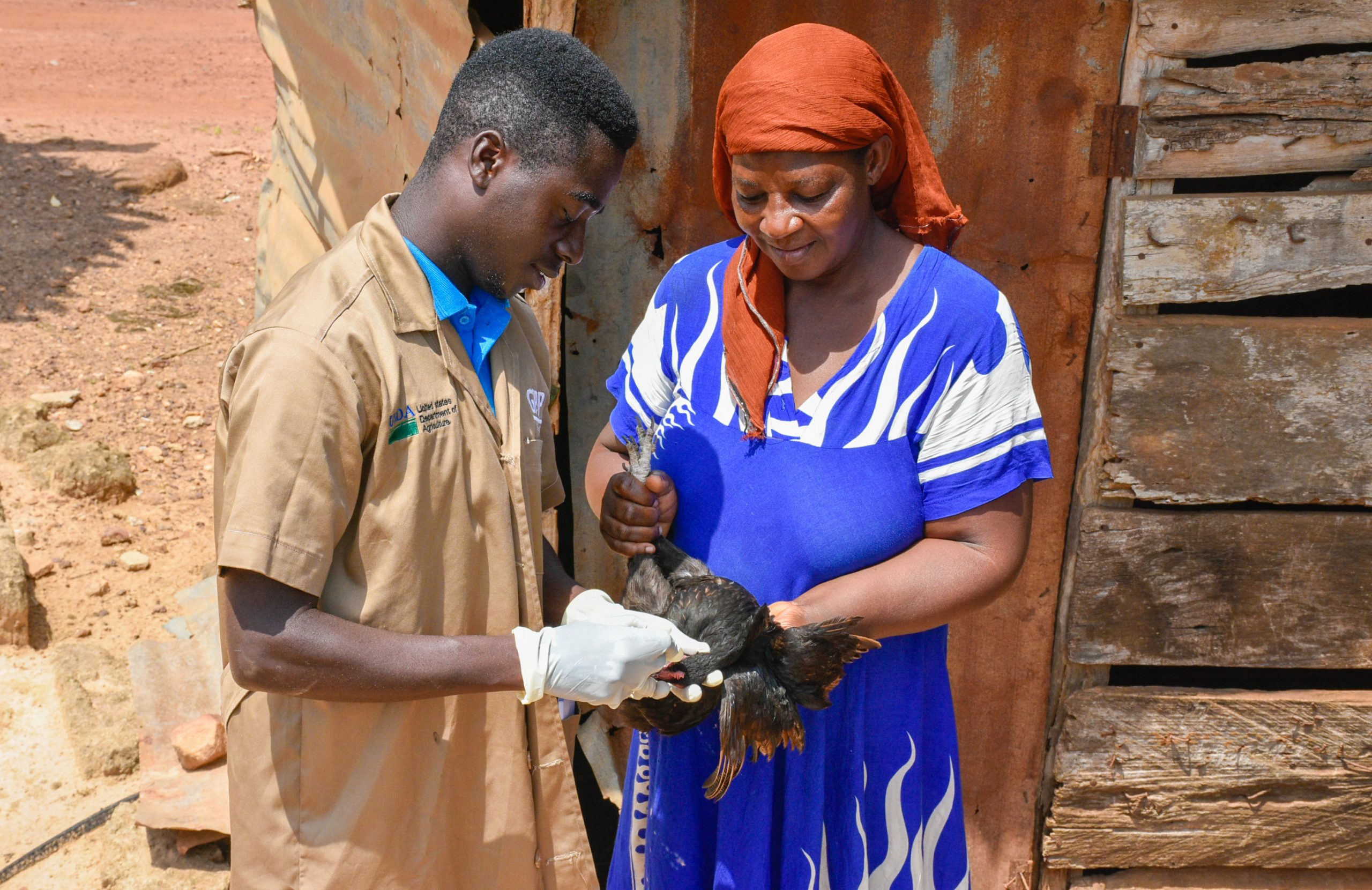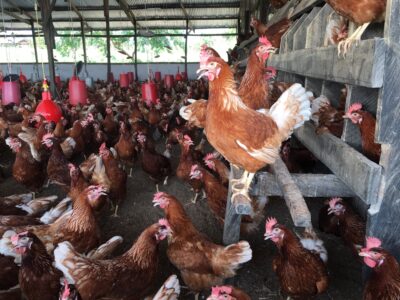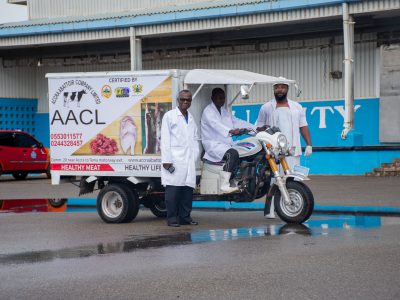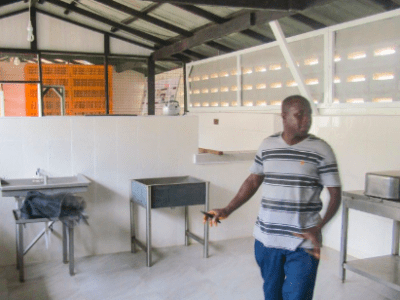
Increasing the Competitiveness of the Production and Processing of Poultry Meat and Eggs
Background Narrative
For nearly a decade, the Ghana poultry sector has contracted as a result of intense competition from imported poultry meat and the decreasing profitability of egg production. According to the Food and Agriculture Organization of the United Nations (FAO), domestically produced broiler meat has fallen from nearly 60 percent of all poultry consumed in Ghana in 2000 to 20 percent in 2011. At the same time, imports have increased from 13,900 metric tons (MT) to over 155,000 MT. The 2013 Global Alliance for Improved Nutrition (GAIN) estimates the 2012 domestic market share of broiler meat at 10 percent of national consumption. This is the result, from 2000 onward, of many poultry producers focusing more on egg production, with production increasing from roughly 5 million eggs in 2000 to 10.9 million eggs in 2011 (FAO), though presently egg sales have significantly slowed.
The high cost of quality blended feeds, that represent more than 60 percent of total production costs, and inefficient feed management practices are largely responsible for the high production costs of poultry products. The USDA-sponsored Ghana Poultry Project increased targeted sector commercial performance by building coordination between firms, promoting the adoption of quality standards, strengthening business planning and market-penetration strategies, and reinforcing buyer-supplier linkages. The five-year Ghana Poultry Program (GPP), funded by the United Sates Department of Agriculture (USDA) and implemented by ACDI/VOCA and TechnoServe, increased the competitiveness of the domestic production and processing of poultry meat and eggs.
Access an overview video (December 2021) about the project here.
Project Objectives
- Increase agriculture productivity in the poultry value chain through capacity building, improving input markets, and promoting strategic investments and private-public partnerships
- Increase the trade of poultry products by improving product quality, increasing production efficiency, and improving market linkages
Project Activity and Approaches
- Capacity Building: for poultry associations and other stakeholders of the poultry value chain to define organizational priorities, establish strategic development plans and develop effective advocacy platforms, improve policy and regulatory framework for the poultry industry, and support trade-related associations to expand market opportunities
- Financial Services: improve access to affordable financing by promoting partnerships among financial institutions, buyers, and suppliers, and encouraging the development of contract/outgrower supply chains and input quality control management systems for poultry producers; implement a subgrant program on a matching basis to leverage public and private investment
- Input Markets and Services: reinforce the linkages between suppliers, distributers, and retailers of veterinary products in collaboration with Veterinary Services, strengthening their capacity to extend diagnostic and prophylactic health services to producers; reinforce commercial linkages with input suppliers by promoting sales contracts/agreements with buyers brokered by the project
- Increase Market Access: support for poultry associations to organize forums where poultry producers can interact with a range of buyers and input and technical and management service providers; connect poultry businesses with end-market buyers to develop and promote value-added segmentation of poultry end-markets; support Poultry Sector Associations, including women groups to coordinate and monitor policy initiatives to support and expand the local procurement of poultry products by importers; implement market development activities to ensure that local production is increasingly capable of meeting the price, quality, delivery requirements, packaging, and other specifications of end-market demand for imported poultry products; initiate social marketing campaigns to heighten awareness of consumers to locally produced poultry products
- Training: ensure the adoption of best management practices in areas such as animal husbandry, vaccinations, and other related areas through the delivery of training by poultry farms to outgrower businesses, where GPP will initially help buy down the cost of technical assistance; assist poultry producer associations to provide demonstrations on cost-effective input management, veterinary, and animal-husbandry best practices for their members; support poultry processing firms to improve the cost efficiency and quality of poultry processing, including linking producers with integrated processing firms and testing toll processing opportunities.
Achieved Project Results
- Provided capacity building trainings to promote adoption of good poultry husbandry practices. Trained 17,721 beneficiaries (37% Females) in productivity practices, with 10,656 Individuals applying improved or new technology.
- Trained and worked with 45 financial institutions and 62 Business Service Advisors through Poultry Financing and Poultry Sector Risk Assessment programs, resulting in innovative financing and 3,318 loans worth USD15.3M to 16,836 beneficiaries.
- Partnered with the Veterinary Services Directorate (VSD) to establish the Community Animal Health Worker (CAHW) program for poultry which trained 501 local agents to provide extension services (husbandry education, vaccinations, input supplies, etc.) to 10,139 Poultry Households in 389 Communities.
- Conducted 74 Poultry Production Demonstrations in partnership with tertiary institutions and outgrower businesses to promote efficient production techniques among farmers. Broiler production period reduced from an average of 10 weeks to 6 weeks which reduces costs and increases year income.
- Promoted agricultural innovations, technology adoption, and marketing through USD2.1M in grants to beneficiaries, leveraged by USD5.5M private/public investment.
- Coordinated poultry production and trade, linking input suppliers, producers, and processors/buyers through 3,444 Commercial Agreements worth USD9.6M.
- Established a poultry Trade Fair in Ghana, now expanded to include other livestock (Livestock, Poultry and Fisheries Trade Show); annually hosted by a private partner and government since 2017.
- Implemented a national social marketing campaign dubbed “Eat Ghana Chicken” to promote consumption of locally produced chicken. More than 500,000 people were reached through the campaign. 11 poultry firms and six groups adopted the campaign strategies.
- Established the Youth Mentorship Program for the leadership and skills development of 75 young entrepreneurs in poultry, involving 20 mentors and mentor farms as well as 9 technical supervisors from three tertiary academic institutions. Graduates established 57 start-up poultry businesses as a result.
- 18 poultry outgrower schemes established, providing training, inputs, and ready market for 634 smallholder farmers.
- Six livestock sector policies, standards, bills supported have moved to next level at various development /implementation stages.
Funder: USDA
Field/Local Contact: infoGPP@acdivocaghana.org

Chief of Party: Carianne De Boer, CdeBoer@acdivoca.org
Project Specialist: Madelyn Dynes, MDynes@acdivoca.org

Project Director: David Fischer, DFischer@acdivoca.org
Related News

AV Ventures Investments Catalyze Ghana Poultry Industry
AV Ventures is pleased to announce two new investments in Ghana: G. I. Nyame Aye Awie Ampa Limited (GINAAAL) and Golden Link Savings and Loans Limited. AV Ventures, a subsidiary …




